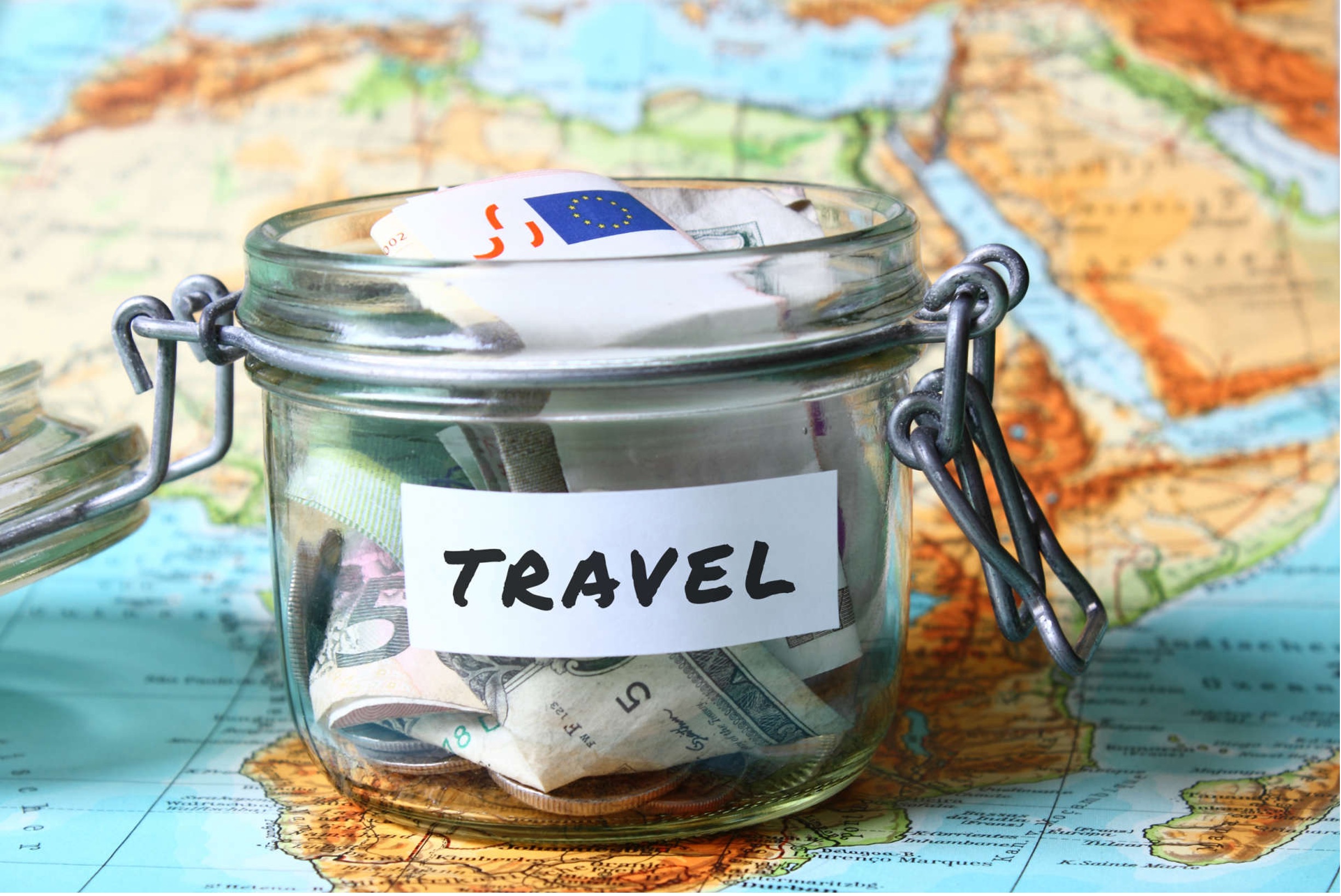Here are 17 tips for affordable travel.

Travel is, for many of us, a distinctly rewarding experience—yet it comes at a price. Sky-high flight costs, accommodation costs, and overpriced restaurants can make budgeting seem impossible, and booking a trip quickly becomes daunting instead of exciting. While your dream getaway may never be a bargain, here are seventeen tips and tricks for cutting travel costs.
1. Talk to locals
Most of us tend to plan our trips in advance, with an ever-growing list of attractions and restaurants around the world we’re eager to experience. But leave some space on your itinerary for spontaneity and get chatting with locals to find their favorite places. Eating where the locals eat is recommended. These off-the-beaten-track kinds of places are often far more affordable with less inflated prices, and you can support a small local business. Avoid eating out in high-pedestrian traffic areas, as these are usually more expensive and not as good. If you’re finding it hard to meet any locals, try asking around at your accommodation. The front desk staff are usually locals and have the best insider intel.
2. Pack sensibly
Airlines have increasingly begun to overcharge on luggage, and there’s just no getting around it anymore. Instead, try to fit as much as you can into a carry-on bag. There are lots of tips and tricks when it comes to how to pack efficiently. Most people agree that rolling your clothes to the smallest possible size is the way to go—this saves space and stops your clothes getting wrinkly. Using packing cubes is another great way to organize your luggage and help make sure you have the right amount of items for your trip.
3. Don’t pay for airline seats
Similarly, airlines often ask travelers to pay for seat selections on flights. As nice as it is sitting next to a friend on a long flight, most of us tend to just plug in and watch movies, listen to podcasts, or read for the journey, so paying extra doesn’t make much of a difference. Save precious cash by allowing the airline to allocate you a seat and take lots of entertainment to distract you and stop you from getting bored.
4. Book flights strategically
There are lots of handy tips and hacks for finding cheaper flights if you know where to look. While many people believe searching for flights in your browser’s incognito mode will help avoid cookies and prevent the airline from raising the price on your most-searched flight routes, this has been proven to be a myth. Instead, check airfare price comparison sites for what dates, months, and times of day are best for booking affordable travel. Being strategic about how you earn and spend airline points and miles can also go a long way—start with joining your favorite airlines’ loyalty programs and figuring out which travel credit card is best for your spending habits.
5. Travel during off-peak periods
Naturally, prices peak during the school holidays and summer months, when everyone wants to travel. Choose to travel during the off-season or shoulder season to get good value for your trips. The more strategic you are with your vacation times, the better the deal you’ll get—particularly for traditionally expensive trips, like safaris. Seasonality should always be considered and prices compared. For example, in November rates drop in the Serengeti, but the 15th of November sees migration in the heart of the park, where there is also a huge concentration of cats and fewer tourists. It’s clever and good value as well as a great experience as the rains don’t tend to set in till December.
6. Don’t overlook travel agents
Most of us tend to book our trips ourselves these days, but while many brick-and-mortar travel agents have disappeared, lots of online travel agents specialize in finding the best value trips for customers. Many travel agents offer to beat any price for flight bookings; if you take screenshots of the flights you want with the cheap price being advertised, they will book the flight for under that price.
7. Think outside the box with accommodations
While Airbnb offers plenty of pocket-friendly choices, if you’re looking to save cash it’s better to be choosy about the location of the accommodation—staying in the city center will always cost more than opting for somewhere on the outskirts or in a lesser-known neighborhood (just make sure there are good connections into the main hub areas). It’s worth messaging Airbnb owners and asking for a discounted rate, especially for last-minute bookings. Other options include home shares or house swaps—Live Kindred is a members-only home-sharing community where users earn credits as they host and are then able to stay at other properties for free. Trusted House Sitters is another site where pet and home-owners offer their house up to travelers willing to look after their animals and property while they’re away.
8. Embrace picnicking
Eating out for breakfast, lunch, and dinner can add up. Opting for a supermarket trip to stock up on essentials and food to make sandwiches (even when staying at a hotel) can save money and allow for a special splurge for a bucket-list restaurant. Most cities have lovely parks or green areas perfect for settling down for a lazy picnic lunch in between museum or gallery-hopping. The same applies to trips; pack your own sandwich and snacks for short and long-haul flights, stopovers, and journeys.
9. Seize the day with hotel breakfast
Even for those of us who aren’t early birds or breakfast people, a quick, included meal can be one of the best ways to fuel up before a full day and avoid the temptation of a pricier option. Spending a little bit more ahead of time can save you lots in the long run, and one place where this almost always rings true is choosing a hotel that includes breakfast. Starting your days with the ritual (even if it’s just a modest continental) saves you the pricey coffees and sit-down lunches. And while hotel breakfasts get a bad rap for being bland and underwhelming, there are plenty of surprising gems out there.
10 .Stick to one destination
As much as I love a multi-destination trip, the cost of flights and trains between countries racks up pretty quickly. Instead, focus on traveling slowly—choose one destination and really get to know it. This way, you’ll be able to discover where the locals hang out: the more affordable restaurants and bars, the under-the-radar galleries to visit, the neighborhoods that give you a feel for the destination. Picking one country versus trying to conquer lots in one trip will save costs on flights and potentially visas. It also allows you to maximize your time instead of moving around from place to place.
11. Do your research
There is no right answer to the debate between package and independent booking—it all depends on the vacation. Some destinations, such as Costa Brava or Sharm el Sheikh, thrive with all-inclusive packages, whereas a quick city break to Paris or Amsterdam may be better organized by yourself. On the one hand, independent bookings offer more flexibility, the control to avoid unnecessary add-ons, and no travel company fees. On the other, package bookings offer bulk savings for families, better financial protection, and no burden of price comparison sites. Ultimately, it comes down to finding the best option for the type of vacation you want to have.
12. Consider a travel pass
Particularly for longer trips, it is a good idea to invest in a travel pass. Daily, weekly, or monthly passes are more cost-effective than single fares, and with no need to wait in line for ticket machines, they are also more convenient. Many cities now offer travel cards tailored to tourists, including quick access to all the popular areas, different modes of transport, and sometimes even airport transfers. If you’re city-hopping in Europe, a great option is the Interrail Pass, offering a range of rail routes across thirty three countries. These passes can be limited to one country or include all and have options from as little as three individual journeys to three months of unlimited travel.
13. Avoid foreign transaction fees
Foreign transaction fees are the charges placed on card payments abroad for currency conversion. They are usually just a small percentage of the purchase, but for frequent travelers, they can quickly add up. Avoid these charges by opening a credit card or bank account with low or even no foreign transaction fees.
14. Choose attractions wisely
The just-arrived buzz you can get at the start of a trip often throws all thoughts of money out the window. This is when you are at risk of racking up unnecessary expenses, so it is important to plan ahead. The most famous gallery in the city may be tempting, but often—if you dig a little deeper—you will find plenty of cheaper (or even free) options available, showcasing work which is just as impressive. Check if a place you want to visit offers free admission in the evenings or on Sundays. Of course, some attractions are worth the extra pennies, so set aside some time to map out a balanced itinerary. Once you have chosen your main event, fill the rest of your day with budget-friendly activities, like hiking, sunbathing on a beach, or visiting a government-funded museum.
15. Visit cheaper destinations
While this may be stating the obvious, falling into the tourist trap of big-ticket places is one of the most common mistakes. One way to steer clear of this is flight-centric planning. Choosing your next vacation spot based on which offers the cheapest flights will prevent the shock of pricey air travel after settling on a destination. Affordable vacation options are neither few nor far—do a little digging to find the countries where the US dollar goes the furthest based on current exchange rates. It’s important to remember cheaper does not always equate to worse—it may simply mean it is yet undiscovered by the travel crowds. Often lesser-known locations are the most beautiful, offering idyllic, unspoiled nature, authentic cultural representations, and, most importantly, the chance to see impressive sights that are not overrun by tourists.
16. Buy a local bottle of wine
There’s no better way to take advantage of a hotel balcony than pairing the view with a glass or two. The bars will always be there for the inevitable cocktail, but between a long day of walking and that post-sunset dinner, it’s advisable to spare yourself the markup on a glass of vino and support the small liquor store you pass on your way through town.
17. Rent a bike
One of the expensive but inevitable costs when traveling is transport, so consider going back to basics with a bike. Seville, Paris, and Copenhagen are just some of the cities across Europe investing in cycling infrastructure, making riding a bike accessible to even the most inexperienced cyclists. Across 70+ European cities, Donkey Republic supplies classic and electric bike rental through their app, with pay-as-you-go fees from as low as $5.20 per hour. Cycling as an alternative is not only kinder on your pockets but kinder on your health and the environment as well.Final Note: Have fun!
As important as it is to stick to your budget, remember you are traveling for a reason—there’s not much point in going somewhere if you are going to avoid doing the things you’ve traveled for. Don’t restrict yourself too much; make sure you’re still able to enjoy your vacation while you’re there!
Twist’s Take: While your dream getaway may never be a bargain, here are 17 tips and tricks for cutting travel costs.
